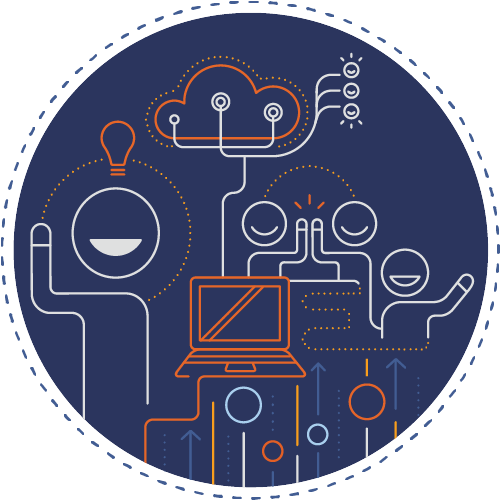- Tags
- Article
- Modernization
- AI
- Governance
- Operations
AI Agents & Governance: The Evolution of Responsible Intelligence

AI is no longer just a tool for automation—it is an evolving intelligence, shaping how businesses operate, how decisions are made, and how industries scale. The rise of AI Agents—systems capable of operating independently, making decisions, and executing complex tasks—brings extraordinary opportunities but also unprecedented challenges.
As we step into this next evolution of AI, the question of governance becomes paramount: Where does AI automation make sense, and where must human oversight remain non-negotiable?The answer will define how AI is embedded into our businesses, our workflows, and ultimately, our future. With so many organizations experimenting with AI agents, the challenge isn’t just about implementation—it’s about building the right foundation for responsible intelligence. Without thoughtful governance, businesses risk losing control of the very systems designed to enhance their capabilities.
AI Agents: Where We Stand Today
Over the past year, the concept of AI Agents have gained traction, evolving from simple task automation into intelligent systems that analyze data, make recommendations, and in some cases, take independent action. Industries that have long relied on static algorithms are now exploring dynamic AI ecosystems that learn, adapt, and execute on their own.
At the CIO Network Summit, discussions highlighted that while AI Agents are becoming increasingly popular, most organizations are still cautious about how much autonomy they should be given.
"AI adoption is accelerating faster than governance strategies can keep up." This insight from LangChain’s recent industry survey reveals that while 68% of organizations are exploring AI Agents, only a fraction have clear governance policies in place.
Key Takeaways:
- AI Agents are evolving beyond automation—businesses are now exploring AI-driven decision-making.
- Governance is lagging behind adoption, creating risk exposure in industries handling sensitive data.
- AI autonomy varies—while most organizations allow AI to “read” data, human intervention is still required for AI to "write" or execute changes.
- Early adopters are feeling the impact—those without structured governance models are running into security, compliance, and ethical dilemmas.
AI Governance: Why It’s No Longer Optional
With the rise of AI Agents, companies are now facing a pivotal shift—how much control should AI have, and how much should remain firmly in human hands?
Governance isn’t just about risk mitigation; it’s about future-proofing AI’s role in business. Without a clear framework, organizations risk AI making unchecked decisions, exposing data vulnerabilities, or operating outside ethical guidelines.
According to Gartner’s research on AI agency, the more decision-making power AI is given, the more complex human involvement becomes. In other words, companies must strike a balance between AI efficiency and ethical responsibility.
Key Takeaways:
- AI governance is no longer a theoretical issue—it is a business imperative.
- Companies with clear AI oversight models are seeing faster adoption with fewer risks.
- Gartner suggests a “Human-in-the-Loop” model—keeping human oversight proportional to AI autonomy.
- The biggest risks emerge when AI governance is reactive rather than proactive.
Co-Creation: Where AI Should Automate & Where Humans Must Lead
As AI Agents become more capable, businesses must define clear boundaries for AI-driven automation versus human-led oversight. Not all tasks require human intervention, but some must remain protected under ethical, legal, and strategic leadership.
The companies that get this balance right will see AI become a strategic advantage. Those that fail to establish boundaries will find themselves in a reactionary position, correcting mistakes AI should never have been allowed to make.
The key is co-creation—where AI operates alongside human intelligence rather than replacing it.
Where AI Could Be Fully Automated:
- Data Processing & Summarization: AI can extract, sort, and analyze large data sets in seconds.
- Fraud Detection & Anomaly Spotting: AI is more efficient than humans in recognizing suspicious patterns.
- Predictive Maintenance & Logistics: AI can optimize supply chains and anticipate failures before they occur.
Where Human Oversight is Critical:
- Final Decision-Making in High-Risk Areas: AI should assist but not replace human leadership in legal, financial, and medical industries.
- Ethical & Contextual Judgment: AI lacks emotional intelligence—humans must guide decisions affecting people’s lives.
- Adaptive Crisis Response: AI can predict but cannot fully comprehend shifting political, environmental, or global crises.
The future of AI is not about eliminating human judgment—it’s about augmenting it with intelligence that enhances our ability to lead, innovate, and make informed decisions.
Best Practices for AI Governance: Building a Responsible Future
AI governance isn’t about limiting innovation—it’s about ensuring AI remains a trusted, transparent, and accountable force within organizations.
Companies adopting AI must create structures that balance automation with oversight. The best governance models are flexible enough to adapt as AI evolves, but structured enough to prevent unintended consequences.
Best Practices for AI Governance:
- Define AI Autonomy Levels: Establish clear guidelines for what AI can and cannot do without human approval.
- Implement "Human-in-the-Loop" Systems: AI should assist, not replace, strategic decision-making.
- Develop AI Ethics & Compliance Frameworks: Ensure AI aligns with legal, ethical, and business values.
- Establish an AI Oversight Committee: Regularly review AI’s role, decisions, and impact.
AI’s Future is Ours to Shape
We are no longer in a world where AI is a passive tool—it is becoming an active participant in business strategy, decision-making, and execution. The key to sustainable AI adoption is not just technological—it is ethical, strategic, and intentional. By embedding responsible AI governance today, we ensure that the intelligence we build serves, rather than replaces, human leadership.
The future of AI is being written now. Let’s ensure it is guided by the best of human intelligence, not just the efficiency of machines.




